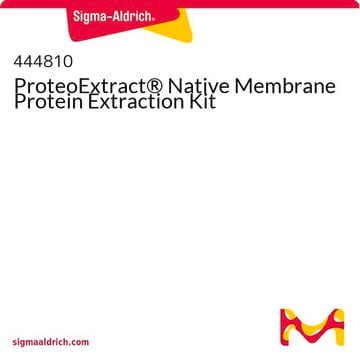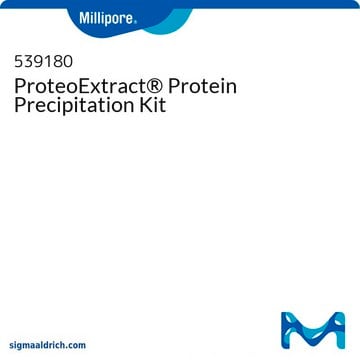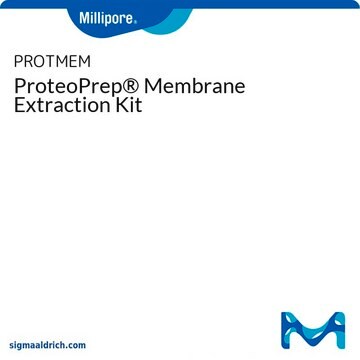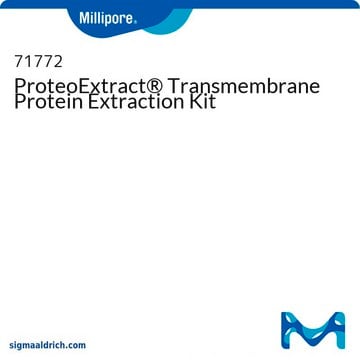539790
ProteoExtract® Subcellular Proteome Extraction Kit
Sinônimo(s):
S-PEK Kit
Faça loginpara ver os preços organizacionais e de contrato
About This Item
Código UNSPSC:
41106500
NACRES:
NA.77
Produtos recomendados
uso
sufficient for 20 extractions
fabricante/nome comercial
Calbiochem®
condição de armazenamento
OK to freeze
avoid repeated freeze/thaw cycles
técnica(s)
fractionation: suitable
entrada
sample type: mammalian tissue(s)
sample type: mammalian cultured cells
Condições de expedição
ambient
temperatura de armazenamento
2-8°C
Descrição geral
Fast and reproducible extraction of subcellular proteomes from mammalian cells
ProteoExtract® Subcellular Proteome Extraction Kit (S-PEK) is designed for fast and reproducible extraction of subcellular proteomes from adherent and suspension-grown mammalian cells. The S-PEK takes advantage of the different solubilities of certain subcellular compartments in the four selected reagents. In the case of adherent cells, the procedure is performed directly in the tissue culture dish without the need for cell removal. Cells or the parts of the cells remain attached to the plate during sequential extraction of subcellular compartments, until the appropriate extraction reagent is used. Thus, the early destruction of the cellular structure by enzymatic or mechanical detachment of cells from the tissue culture plate and any mixing of different subcellular compartments is prevented. For suspension-grown cells, extraction starts with gentle sedimentation and washing of the cells. The stepwise extraction delivers four distinct protein fractions from one sample:
Sample size: 3-5x106 or 25-50 mg tissue.
ProteoExtract® Subcellular Proteome Extraction Kit (S-PEK) is designed for fast and reproducible extraction of subcellular proteomes from adherent and suspension-grown mammalian cells. The S-PEK takes advantage of the different solubilities of certain subcellular compartments in the four selected reagents. In the case of adherent cells, the procedure is performed directly in the tissue culture dish without the need for cell removal. Cells or the parts of the cells remain attached to the plate during sequential extraction of subcellular compartments, until the appropriate extraction reagent is used. Thus, the early destruction of the cellular structure by enzymatic or mechanical detachment of cells from the tissue culture plate and any mixing of different subcellular compartments is prevented. For suspension-grown cells, extraction starts with gentle sedimentation and washing of the cells. The stepwise extraction delivers four distinct protein fractions from one sample:
- Cytosolic fraction (F1)
- Membrane/organelle protein fraction (F2)
- Nucleic protein fraction (F3)
- Cytoskeletal fraction (F4)
Sample size: 3-5x106 or 25-50 mg tissue.
Características e benefícios
- Stepwise extraction resulting in four distinct subcellular proteomes from one sample
- Highly reproducible
- No ultracentrifugation steps
- Fast—needs just 2 hours with 45 minutes hands-on time
- Produces proteins suitable for functional studies
Componentes
Wash buffer, Extraction Buffer I, Extraction Buffer II, Extraction Buffer III, Extraction Buffer IV, Protease Inhibitor Cocktail, Benzonase® Nuclease (Cat. No. 71206), and a user protocol.
Advertência
Toxicity: Multiple Toxicity Values, refer to MSDS (O)
Princípio
The Calbiochem ProteoExtract Subcellular Proteome Extraction Kit is designed for the subcellular extraction of mammalian proteins from the cytosolic, organelle and membrane, nuclear, and cytoskeletal fractions of adherent tissue culture cells, suspension tissue culture cells, frozen cell pellets, and fragmented tissues.
Nota de preparo
Kit Components Needed for One Extraction
The volume of each component required for one subcellular extraction depends on the amount of starting material.
The volume of each component required for one subcellular extraction depends on the amount of starting material.
Appropriate samples types include:
- Adherent tissue culture cells
- Suspension-grown tissue culture cells
- Frozen cell pellets
- Fragmented tissue
Armazenamento e estabilidade
Prior to performing the extraction protocol all frozen buffers must thawed at room temperature. A water bath set at 25°C will aid in the thawing process. After thawing, mix the buffers well gentle shaking or vortexing.
Outras notas
Zhang, L., and Insel, P. A. 2004. J. Biol. Chem.279, 20858.
Yuan, X., et al. 2002. Electrophoresis23, 1185.
Butcher, et al. 2001. J. Immunol.167, 2193.
Ott, et al. 2001. Pharmacogenomics J.1, 142.
Allen, L. 2000. Nature405, 819.
Dunn, M. J. 2000. Electrophoresis 6.
Rabilloud, T. 2000. Two-dimensional Gel Electrophoresis and Identification Methods Springer-Verlag
Mejdoubi, et al. 1999. Biochem. Biophys. Res. Comm.254, 93.
Reymond, et al. 1997. Electrophoresis18, 2842.
Laemmli, U. K. 1970. Nature227, 680.
Lowry, et al. 1951. J. Biol. Chem.193, 265.
http://www.expasy.ch/ and http://www.expasy.proteome.org.au
Yuan, X., et al. 2002. Electrophoresis23, 1185.
Butcher, et al. 2001. J. Immunol.167, 2193.
Ott, et al. 2001. Pharmacogenomics J.1, 142.
Allen, L. 2000. Nature405, 819.
Dunn, M. J. 2000. Electrophoresis 6.
Rabilloud, T. 2000. Two-dimensional Gel Electrophoresis and Identification Methods Springer-Verlag
Mejdoubi, et al. 1999. Biochem. Biophys. Res. Comm.254, 93.
Reymond, et al. 1997. Electrophoresis18, 2842.
Laemmli, U. K. 1970. Nature227, 680.
Lowry, et al. 1951. J. Biol. Chem.193, 265.
http://www.expasy.ch/ and http://www.expasy.proteome.org.au
Informações legais
Benzonase is a registered trademark of Merck KGaA, Darmstadt, Germany
CALBIOCHEM is a registered trademark of Merck KGaA, Darmstadt, Germany
PROTEOEXTRACT is a registered trademark of Merck KGaA, Darmstadt, Germany
Classificações de perigo
Aquatic Chronic 3 - Eye Irrit. 2 - Skin Irrit. 2
Classe de risco de água (WGK)
WGK 3
Certificados de análise (COA)
Busque Certificados de análise (COA) digitando o Número do Lote do produto. Os números de lote e remessa podem ser encontrados no rótulo de um produto após a palavra “Lot” ou “Batch”.
Já possui este produto?
Encontre a documentação dos produtos que você adquiriu recentemente na biblioteca de documentos.
Os clientes também visualizaram
Damir Janigro et al.
BMC cancer, 6, 72-72 (2006-03-21)
Tumor burden can be pharmacologically controlled by inhibiting cell division and by direct, specific toxicity to the cancerous tissue. Unfortunately, tumors often develop intrinsic pharmacoresistance mediated by specialized drug extrusion mechanisms such as P-glycoprotein. As a consequence, malignant cells may
Roberta Benetti et al.
The Journal of biological chemistry, 280(23), 22070-22080 (2005-04-09)
Beta-catenin is a multifunctional protein serving both as a structural element in cell adhesion and as a signaling component in the Wnt pathway, regulating embryogenesis and tumorigenesis. The signaling fraction of beta-catenin is tightly controlled by the adenomatous polyposis coli-axin-glycogen
Yun Seon Song et al.
Journal of cerebral blood flow and metabolism : official journal of the International Society of Cerebral Blood Flow and Metabolism, 27(4), 764-775 (2006-07-27)
Nuclear factor-kappa B (NF-kappaB) is activated by oxidative stress such as that induced by transient focal cerebral ischemia (tFCI). Whether NF-kappaB has a role in cell survival or death in stroke is a matter of debate. We proposed that the
Jean-François Groulx et al.
Carcinogenesis, 35(6), 1217-1227 (2014-01-10)
The integrin α6 subunit pre-messenger RNA undergoes alternative splicing to generate two different splice variants, named α6A and α6B, having distinct cytoplasmic domains. In the human colonic gland, these splice variants display different patterns of expression suggesting specific functions for
Ying-Hsi Lin et al.
Cellular signalling, 28(8), 1015-1024 (2016-05-18)
The mechanotransduction signaling pathways initiated in heart muscle by increased mechanical loading are known to lead to long-term transcriptional changes and hypertrophy, but the rapid events for adaptation at the sarcomeric level are not fully understood. The goal of this
Nossa equipe de cientistas tem experiência em todas as áreas de pesquisa, incluindo Life Sciences, ciência de materiais, síntese química, cromatografia, química analítica e muitas outras.
Entre em contato com a assistência técnica












